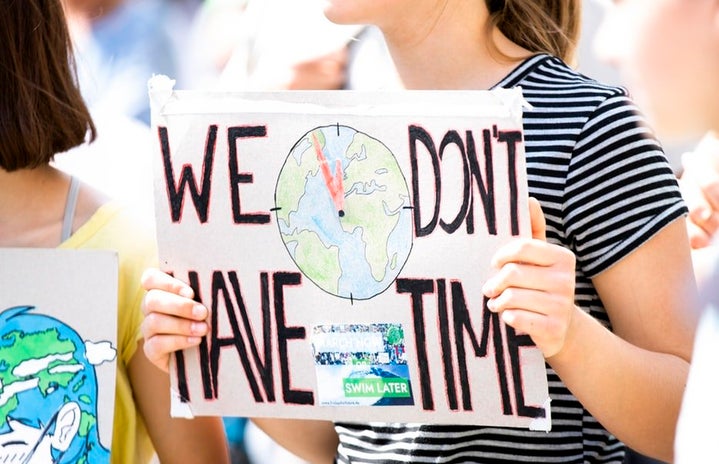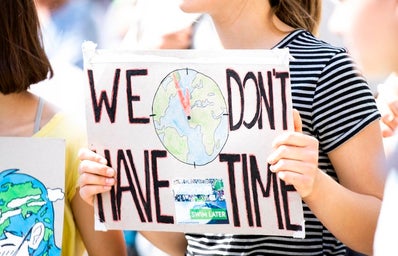Advocacy for stronger action to combat climate change has never been more important. The United Nations has warned that there are only 11 years left to prevent catastrophic damage from climate change, but there is still debate about what exactly should be done. An emerging generation of activists is promoting actions that could help us prevent such damage.
Here are seven female climate activists advocating for a better, more sustainable future:
Oldaosu Adenike – Nigeria
Oldaosu Adenike, a 25-year-old from Nigeria, is an ambassador for organizations such as Earth Uprising, African Youth Climate Hub and Fridays for Future. She is a self-proclaimed ecofeminist. Ecofeminism draws upon gender principles to evaluate the state of the natural world.
“As an eco-feminist, the trio of insecurity, conflict and wars are political disagreement within an environmental and has a feminist implication (that is on girl and women),” Adenike writes in a Medium article. “This is because women, girls and the environment are seen as the first victims of conflict.”
Adenike calls for education and empowerment through ecofeminism in order for African women to find self-empowerment.
You can find Adenike on Twitter and Instagram.
Amariyanna “Mari” Copeny – United States
Amariyanna “Mari” Copeny, also known as Little Miss Flint, began her activism career at 8 years old. She wrote to President Barack Obama in 2016 to convince him to visit Flint, Michigan, so he could witness the water crisis firsthand. Her letter was successful. Obama visited Flint in May 2016 with substantial national attention given to the trip.
“His trip proved to me that a kid can change the world,” Copeny said in an article published by Oprah Magazine.
Copeny, now 12, has spent years fundraising to support children in Flint and other places. The money has funded not only clean water but also school supplies and other resources. While she initially distributed bottled water, Copeny’s focus is now on providing environmentally friendly water filtration devices on a national scale.
You can find Copeny on Twitter and Instagram.
Sumak Helena Gualinga – Ecuador
Sumak Helena Gualinga, 17, is part of the Sarayaku indigenous community of the Pastaza province. Her introduction to environmental activism stemmed from witnessing firsthand the negative effects oil companies had on her community.
At the 25th annual UN Climate Change Conference (COP25), Gualinga delivered an impassioned speech expressing her disappointment in land abuse on the part of government leaders.
“Indigenous people are putting their lives at risk in order to protect their territories, and yet the governments have the face to come to spaces like COP and brag about how they are preserving the world’s biodiversity,” Gualinga wrote in an Instagram post caption.
You can find Gualinga on Twitter and Instagram.
Vanessa Nakate – Uganda
Vanessa Nakate, 23, began her activism after noticing abnormally high temperatures in her home country. Inspired by Greta Thunberg, she began protesting outside of the Parliament of Uganda gates. She founded Youth for Future Africa, as well as the Rise Up Movement, which is based in Africa.
Nakate’s work became viral in February 2020 after she attended the World Economic Conference in Davos, Switzerland. Upon viewing news coverage of the conference, she noticed that AP had cropped her from a photograph of other young activists. After an outpouring of online support, Nakate has gained global recognition, as well as a verified Twitter account and new followers. In interviews, she has stated her intent to ensure African climate activists are included in climate action coverage.
You can find Nakate on Twitter and Instagram.
India Logan-Riley – Australia
India Logan-Riley is a part of a group called Te Are Whatu, comprised of Maori and New Zealand-based people organizing community work around climate change. She focuses on climate justice, which frames global warming as an issue with ethical and political implications that accompany environmental concerns; she also incorporates ecofeminism into her activism.
“We are the ones who are going to be stepping in the shoes of the pathways that have been laid down by our ancestors,” she said in an interview with Indigenous Climate Action. “There is something transformative and powerful when Indigenous people get together, so I don’t even think we can start to imagine the limits of what could happen because anything can happen when we just hang out and share knowledge.”
You can find Logan-Riley on Twitter and Instagram.
Shalvi Sakshi – Fiji
Few countries are more vulnerable to climate change than Fiji. By 2050, 1.7 million people could be displaced due to the effects of climate change. Shalvi Sakshi has emerged as a young voice advocating for Fiji’s future.
“Every single person on this Earth has the power to change the world,” Sakshi said in her speech at the UN’s COP23 in 2017. In the same speech, she emphasized that climate change is a human-generated phenomenon, and thus, it is a human responsibility to fix it. Sakshi also called for world leaders to halt greenhouse gas emission. Ten years old at the time, Sakshi was the youngest speaker at the conference.
Greta Thunberg – Sweden
At 17 years old, Greta Thunberg has rapidly become a global voice in environmental activism. At the UN Climate Action Summit in September 2019, Thunberg delivered a powerful speech, which began with a response to a question regarding the message she had for world leaders. “You are failing us,” she said. “But the young people are starting to understand your betrayal. The eyes of all future generations are upon you. And if you choose to fail us, I say: We will never forgive you.”
Soon after this speech, student climate strikes occurred globally.
Thunberg was later named the Time’s 2019 Person of the Year, making her the youngest person to receive the accolade.
You can find Thunberg on Twitter and Instagram.
This article is part of an ongoing series surrounding issues of sustainability and the climate crisis.



